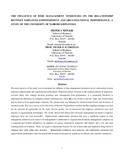The influence of time management tendencies on the relationship between employee empowerment and organizational performance

View/
Date
2012Author
MONARI, FRONICA
K’OBONYO, PETER O.
ANDOLLO, AGNES ANYANGO
Type
OtherLanguage
enMetadata
Show full item recordAbstract
The main objective of this study was to determine the influence of time management tendencies on the relationship between employee empowerment and organizational performance. Preference-driven variations in the temporal pattern of employees’ activities affect their strategic decision processes and, consequently firm performance. It is potentially beneficial to understand the differences in workplace attitudes and behaviors which affect use of time so that the "right" mix of individuals may be hired to fit an organization’s situation. The present study was informed by Attention-based theory and the theory of reasoned action. This was a survey of the University of Nairobi. Proportionate stratified random sampling technique was used for the selection of respondents for the study. Service quality, rate of innovation and employee satisfaction were used measure to organizational performance. The results showed that efforts that University management has made to empower employees have not been successful. Organizational empowerment practices that have a significant impact on time management tendencies were found to be management’s commitment to organizational feedback, management’s emphasis on a congenial and friendly atmosphere, its emphasis on greater cooperation, teamwork, and support, and a free and open communication environment. There was negative relationship between the rate of innovation and employees being forced to complete their work within time allocated. Monochronic tendencies were positively and significantly correlated with organizational performance while the polychronic orientation had positive significant correlation with customer satisfaction.
Publisher
School of Business, University of Nairobi
Description
Influence of time management tendencies on the relationship between employee empowerment and organizational performance
Collections
- School of Business [175]
